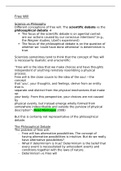College aantekeningen
Class notes on Free Will vs Determinism (W_BA_PNEU)
Detailed notes on the free will vs determinism debate. Considers the scientific debate and the philosophical debate. Looks at the problems with both. Discusses varying positions within free will, including compatibilism, libertarianism, and hard determinism.
[Meer zien]





